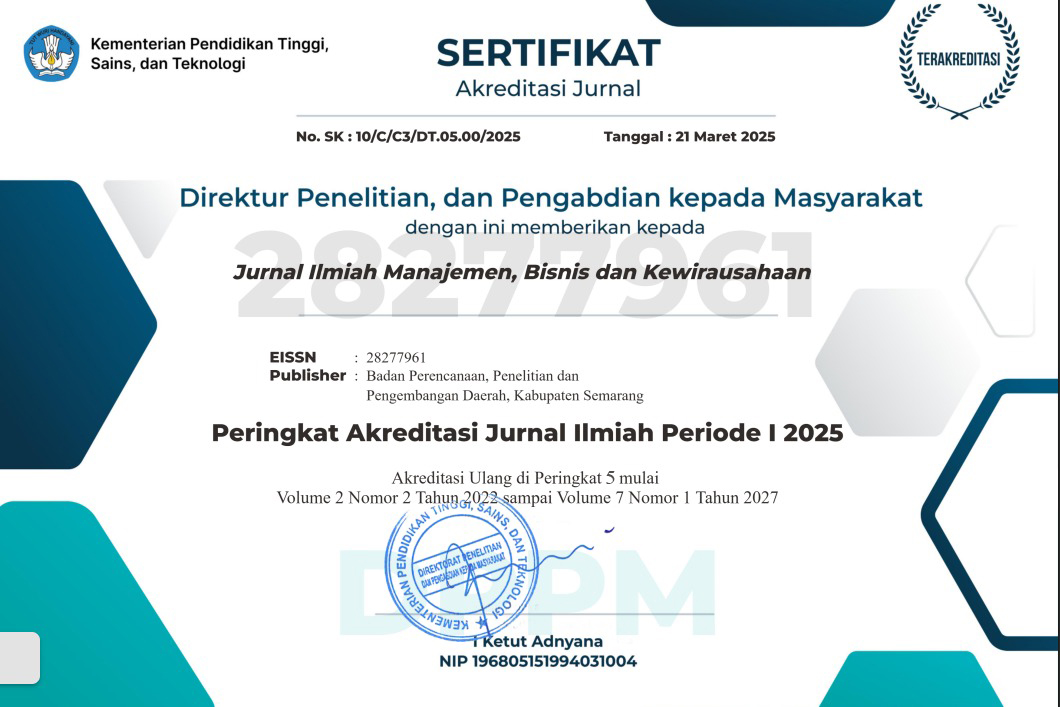PENGARUH STRATEGIC ORIENTATION, GOVERMENT REGULATION, DAN REVERSE LOGISTICS TERHADAP GREEN SUPPLY CHAIN MANAGEMENT PADA PT XYZ
DOI:
https://doi.org/10.55606/jurimbik.v3i3.539Keywords:
strategic orientation, government regulation, reverse logistics, green supply chain management.Abstract
Companies are required to apply the concept of green supply chain management to minimize environmental pollution which is increasingly polluted. This study aims to determine the influence of strategic orientation, government regulation and reverse logistics on green supply chain management at PT XYZ as one of the companies that applies the concepts of strategic orientation, government regulation and reverse logistics in its production process. This study was conducted with a quantitative approach and associative research design with a sample of 127 respondents. The instrument used by researchers is a questionnaire. Quality testing on research instruments is a test of validity and reliability. Data analysis uses descriptive analysis, while for hypothesis testing using multiple linear regression. The results of this study explain that there is a positive and significant relationship between strategic orientation, government regulation and reverse logistics towards green supply chain management with a correlation coefficient value. This analysis was only conducted on one company and did not take into account other variables or moderator variables that affect green supply chain management.
References
Amaranti, R., Irianto, D., Govindaraju, R., Magister, S., Doktor, D., Dan, T., … Industri, F. T. (2017). Green Manufacturing : Kajian Literatur. Seminar Dan Konferensi Nasional IDEC, 8(9), 171–181.
Clemens, B., & Douglas, T. J. (2018). Does coercion drive firms to adopt ‘voluntary’ green initiatives? Relationships among coercion, superior firm resources, and voluntary green initiatives. Journal of Business Research, 59(4), 483–491. https://doi.org/10.1016/j.jbusres.2005.09.016
DeSarbo, W. S., Di Benedetto, C. A., & Song, M. (2017). A heterogeneous resource based view for exploring relationships between firm performance and capabilities. Journal of Modelling in Management, 2(2), 103–130. https://doi.org/10.1108/17465660710763407
Fortes, J. (2017). Green Supply Chain Management : A Literature Review Supply Chain Management : Back to the Basics. Otago Management Graduate Review, 7, 51–62.
Foster, C., Green, K., Bleda, M., Dewick, P., Evans, B., Flynn, A., & Mylan, J. (2018). Environmental impacts of food production and consumption: A report to the Department for Environment Food and Rural Affairs. London, Manchester Business School, 199.
Ghozali, I. (2018). Aplikasi Analisis Multivariate Dengan Program IBM SPSS 25 Edisi 9. Badan Penerbit Universitas Diponegoro.
Jayaraman, V., & Luo, Y. (2017). Creating Competitive Advantages Through New Value Creation: A Reverse Logistics Perspective. Academy of Management Perspectives, 21(2), 56–73. https://doi.org/10.5465/amp.2007.25356512
Kirchoff, J. F., Tate, W. L., & Mollenkopf, D. A. (2016). The Impact of Strategic Organizational Orientations on Green Supply Chain Management and Firm Performance. International Journal of Physical Distribution and Logistics Management, 46(3), 269–292. https://doi.org/https://doi.org/10.1108/IJPDLM-03-2015- 0055
Namdev, V., & Nimawat, D. (2012). An Overview of Green Supply Chain Management in India. Research Journal of Recent Sciences, 1(6), 77–82.
Nezakati, H., Abbasian Fereidouni, M., Abd Rahman, A., & Malaysia, P. (2016). An Evaluation of Government Role in Green Supply Chain Management through Theories. International Journal of Economics and Financial Issues |, 6(S6), 76–79. Retrieved from http:www.econjournals.com
Wurjaningrum, F., & Auliandri, T. A. (2015). Analisis Antaseden Reverse Logistics Capabilities Dan Penghematan Biaya Usaha Kecil Dan Menengah Di Surabaya Dan Sekitarnya. Jurnal Manajemen Teori Dan Terapan, 8(3). https://doi.org/10.20473/jmtt.v8i3.2733
Zhou, K. Z., Gao, G. Y., Yang, Z., & Zhou, N. (2017). Developing strategic orientation in China: antecedents and consequences of market and innovation orientations. Journal of Business Research, 58(8), 1049–1058. https://doi.org/10.1016/j.jbusres.2004.02.003
Zhu, Q., Sarkis, J., & Lai, K.-H. (2018). Green supply chain management implications for “closing the loop.” Transportation Research Part E: Logistics and Transportation Review, 44(1), 1–18. https://doi.org/10.1016/j.tre.2006.06.003
Zsidisin, G. A., & Siferd, S. P. (2020). Environmental purchasing: a framework for theory development. European Journal of Purchasing & Supply Management, 7(1), 61–73. https://doi.org/10.1016/S0969-7012(00)00007-1
Downloads
Published
How to Cite
Issue
Section
License
Copyright (c) 2023 Jurnal Ilmiah Manajemen, Bisnis dan Kewirausahaan

This work is licensed under a Creative Commons Attribution-NonCommercial-ShareAlike 4.0 International License.










